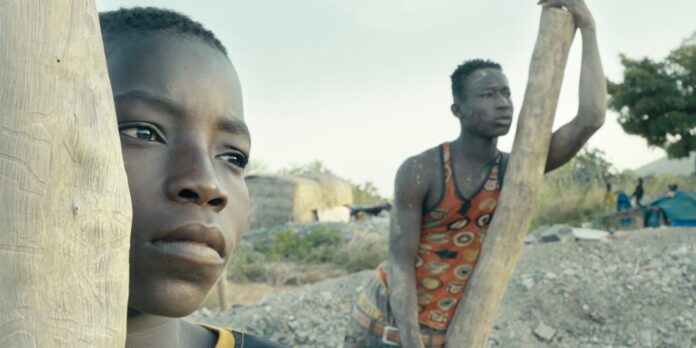At 13, Opio works at the Perkoa gold mine in Burkina Faso. From the surface, he pulls a rope to bring up the miners lowered in a hole 250 meters deep. As a salary, he receives a bag of pebbles, which he must process himself to extract the gold. Work to earn a pile of stones and a little hope is what it shows If you are a man by French documentary filmmaker Simon Panay. The men referred to in the title are the ones who go down into the mine. It is this right that Opio claims before his age from his boss. His goal: to raise 35,000 CFA francs that will allow him to pay the monthly fees necessary to study. This way you will gain more bags of stones and hope…
Simon Panay reveals himself as the chosen one in the lives of the miners, prisoners of the mirage of the gold rush and the unbridled race it induces. Following Opio, handheld camera, the 29-year-old director immerses us in this prison universe. The rays of sunshine are those brought by friendship and solidarity between the miners, obstructed by clouds of distrust towards those who could steal them. The fate of Opio Bruno Bado resembles that of Sisyphus, condemned to roll a stone to the top of a mountain, where he invariably falls. If you are a man it grabs the entrails and, even if its author defends himself from any political commitment, opens his eyes to a dark part of the human social condition.
Jeune Afrique: Why did you decide to do it If you are a man ?
Simon Panay: I have been making documentaries in West Africa and, more particularly, in Burkina Faso for ten years. I already realized Nobody dies here, a short documentary on an illegal gold mine in Benin. The world of artisanal mining has its codes, its laws, its own mythology. These are places where the real and the fantastic mix. The child labor I had seen at the time made a deep impression on me and I wanted to continue working about this subject.
Can you tell us about the connection between Burkina Faso and you, a 29-year-old man from Sologny in Saône-et-Loire, the son of winegrowers in France?
I became friends with Souleymane Drabo, a Burkinabé documentary filmmaker, who insisted that I come and make a documentary in Burkina. He said there were many to discuss. I was 18 and didn't plan on making documentaries or going to Africa. I fell in love with documentaries and with Burkina, which became my second country. It's my favorite and adopted homeland, I lived there for part of my adult life and I want to continue making films there.
How did you discover Opio?
I was involved in a photo collection project and visited about thirty mines in Burkina Faso. When he met Opio, he waited at the processing site, where people break up pebbles and sift them to get nuggets of gold. At 13, he was the youngest in the group, the others were between 18 and 20 years old. I approached the eldest to ask permission to take a photo, because generally, in Burkina, it is the eldest who decides for the entire group. I was surprised to see that all the big names asked Opio for advice. Opio took time to think about it and told me it was okay. I found it atypical. I was looking for a child for a documentary project, but I didn't know which one. I didn't have a specific situation in mind. I just wanted a character with a strong character. Opium emits an electrical intensity. He has a charisma that you can immediately notice.
How do you make people forget the camera?
I think you never completely forget the camera. It is illusory to believe this. You can gain the trust of the people you film if you know them. The human adventure behind the documentary is fundamental. It is this trust that will lead the people filmed to offer you gifts: they let you enter into their intimacy knowing that you will not judge or betray them.
How do we film everyday life?
You have to choose the moments you are going to film, which requires permanent availability. We arrived at the mine at 6 am. We leave at dusk, at 7-8pm. There are many days where we don't film a single second because often nothing interesting happens. What's complicated about a documentary is that it requires constant attention, even more so when you don't understand the dialect. Pay attention to body language and intonations. Sometimes we film scenes that seem interesting and, when adding subtitles, sad that they aren't. And conversely, scenes that didn't seem like much end up being crucial to the film.
Opium hits rocks for a living. His salary consists of a bag of rocks that he will have to hit to eventually find gold. Is the mine an open-air prison?
The mine is a prison because people are slaves to themselves. They come thinking they are free and in reality they are trapped in a vicious cycle. They hope to earn a lot of money, change their daily lives and that of their family. Most miners stay for years, sometimes losing family and friends in accidents. But it's hard to quit because you say to yourself, “I've been working hard for five years. Maybe the wealth is for tomorrow or next week and if I leave now, I did it all for nothing. This logic leads people to judge ten or twenty years.
It's an unbridled race from which the surrounding people benefit, through the businesses that are established around the mine...
Yes, it's a game where those who win money are those who don't bet. Some sell perfumes that supposedly attract gold, at 10,000 CFA francs a bottle. In the Gourounsi culture of the Sanguié region, gold is not a metal, but an animal that must be tracked, hunted, baited, tame. There are things that attract gold and others that scare it away. For example, women are brought into the underground galleries because they are supposed to be a contrast. As in the American gold rush, those who get rich are the owners of bars or brothels. When a gold digger makes money, he spends his hard-earned money buying rounds for his friends. In Burkina, it is said that money obtained from gold is cursed. Even when miners win, they lose.
Film “if you are a man” © Ciné Sud Promotion Film “if you are a man” © Ciné Sud Promotion 
Opio's father tells him that he must return home, just like his mother, but he does not speak when asked about it. How do you decipher Opio's relationship with his family?
Opio set out on his own at the age of 8, to become financially independent and provide relief to his family. I think he had to forge a kind of shell to protect himself from the adult world. As soon as he is confronted with an authority figure, he usually sinks into silence, while generally being a lively boy. Your family situation is complicated. His father resents the fact that one of his sons has become a gold miner. The mine is frowned upon in neighboring villages because the miners have a reputation for being bandits.
In the mine and in the village there is camaraderie, jokes, but also distrust, acceptance, swearing. Does money rot social relationships?
The mine is a very harsh world, but that's not all. There is also light, camaraderie, friendship, tenderness. I was committed to showing all sides of myself.
Who operates the mine?
The Perkoa mine is a legal gold mine, authorized by the ministry to operate. It does not belong to a company or a person. When a boss wants to invest in gold, he pays for an exploration license to buy a very small lot. There are a hundred different bosses, a hundred holes, many of which were drilled and left behind because the boss ran out of money. The boss hires his team, who pays them in bags of pebbles according to the work done, and everyone hopes that the pebbles have won gold.
Does the socio-political context seem secondary to the story?
For me, the most important thing is people. I wanted to open a window into Opio's life. I wanted to say as accurately as possible who he is, what he does. This is not an investigative documentary. This is not a journalistic investigation. Much information is not provided, but can be guessed between the lines.
Is the function of the film to show reality, explain it or modify it?
I see myself as an observer. I am not a judge. I'm not a journalist. I don't bring morals. I wanted to give my documentary a cinematic dimension. But when we see this film, we inevitably think about child labor and, even if it wasn't our main objective, we have, for example, a connection with Unicef.
What was Opio's reaction when he saw the film?
Before filming, I promised Opio and the miners that they would be the first to see the documentary. We went to Burkina and showed the film in the mine. It was an extraordinary moment. I think this is the first time I've seen Opio really moved. Even though we shared his life for a long time and got to know each other, he never completely abandoned the shell behind which he protects himself.
Opio's monthly fees are 35,000 CFA francs, the equivalent of 53 euros. Do you think Opio's life will change after this film?
We helped him with our means and during the screening of the film we felt that viewers were coming to see us to tell us that Opio had upset him and that he wanted to help him financially. Then raise a Leetchi kitten. Let's raise this money to help you with your professional project and support you in the long term.
If you are a man by Simon Panay, documentary, released in France on the 1st march 2023

